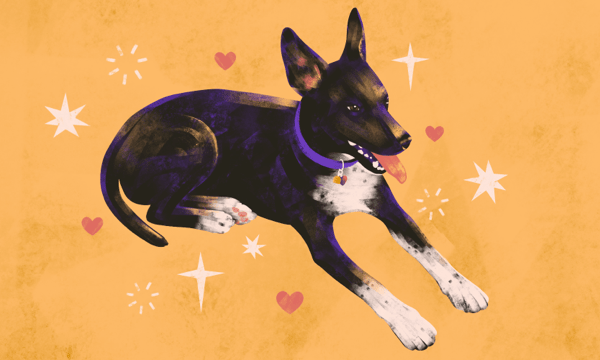Andrea Gallant: Being a Dog Mom With Early Onset Alzheimer's Disease
For this article, the AlzheimersDisease.net Editorial Team interviewed Andrea Gallant, who has previously shared about her experience being diagnosed with early-onset Alzheimer's. Andrea is back to share how her furry best friend supports her.
Sadee
Editorial: Tell us about your dog. What’s her name? When did you get her? What influenced you to get a dog?
Andrea: My dog’s name is Sadee. It’s spelled a bit differently than the traditional “Sadie” because I didn’t want her name to end in “die.” Funny how you think of those things after a diagnosis.
The big worries prior to rescuing Sadee were: Would I be able to take care of her? Would I outlive her? Am I up to the responsibility? What dog is the right fit for me? I decided an energetic puppy would be too much for me, and a senior dog might require more care than I could give. I opted for a young dog, one that was trainable and that would enjoy long walks, but not too big or energetic. Once I decided to rescue, I made arrangements with both a relative and a friend to take Sadee should I be unable to care for her or if she were to outlive me.
After a year of contemplation and searching, I rescued Sadee in March 2021. I had wanted a dog, but I worked long hours and thought it would be unfair to have a dog when I wouldn’t be around much. Now that I was no longer working and had hours to fill, it seemed like the perfect time. Additionally, I believed I was capable of training a dog now to help me with issues that might arise in the future.

Sadee is a big help!
Editorial: How does your dog aid you? Is she mainly a comfort companion? Have you trained her to do any specific tasks to help you? Was it hard to train her?
Andrea: Sadee and I are the perfect fit. The love is there; the energy and play level is just right for both of us. While she is a wonderful companion, she is also a worker. When I brought Sadee home, she was crate-trained and mostly potty-trained. Now, she has been taught basic commands such as sit, shake, wait, up, down, in, easy, drop, and speak. She’s also trained to take me home, take me to Daddy, and take me to the car. She has been trained to lay at my feet in public places and to walk by my side. She has been trained to wait for an “okay” prior to crossing a street. Currently, Sadee and I are working on “get” and on ignoring outside influences like rabbits, cats, and other distractions.
As I become less capable, I may have to rely on Sadee to care for me. For example, if I become lost during our walk or become separated from my husband during an outing, these commands could be invaluable. The “get” command is useful if I drop things or become unsteady on my feet. Sadee is registered as a service dog, and I rarely go anywhere without her. Sadee has been pretty easy to train, as she wants to please. The hardest part of training is getting her to understand what it is I want her to do. Once she understands that, treat motivation makes training easy.
Should people with Alzheimer's get a service or companion dog?
Editorial: Do you recommend dogs to people with Alzheimer’s disease? Why?
Andrea: If a person with Alzheimer’s disease wants a dog and is willing and able (or someone in their household is willing and able) to properly care for and commit to spending time with a pet, I see no reason why they shouldn’t have one.
A dog loves unconditionally and can be an excellent companion and a wonderful assistant. The neurologists say that exercise and keeping an active mind are beneficial for Alzheimer’s patients. Playing with and walking a dog make exercise easy, and training a dog and scheduling potty breaks and feedings certainly keep the mind active.
Follow your instinct
Editorial: How has having a dog surprised you?
Andrea: What has surprised me the most is that some friends and acquaintances strongly urged me to reconsider becoming a dog owner. They believed a person with Alzheimer’s would not be a good dog owner. They argued feedings and walking could be forgotten. They worried that as the disease progressed, I would be unable to care for the dog and that it would be unfair to the dog to change owners.
I appreciated their concern and candidness, but I couldn’t disagree with them more. I’m a great dog mom. I have alarms set to remind me (in the event I forget) of feedings and walks. I’ve been responsible, making sure there is a loving home for Sadee should the worst happen. And I especially don’t believe life’s decisions should be made for what-ifs and could-bes.
Editorial: Anything else you would like to add?
Andrea: Happiness is being a dog owner. Sadee also seems extremely happy to have been rescued and to be living in a loving home.
Interested in more articles about the benefits of animals for people with Alzheimer's? Check out the following articles:
What Animals Can Give: Animal Therapy to Cope with Dementia
The Favourite Visitors: Animals and Alzheimer's Disease
Do you or a loved one have a pet? How do they help? Let us know in the comments, or share your story with the community.

Join the conversation